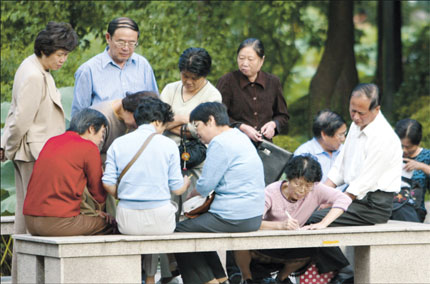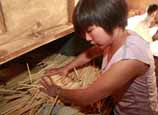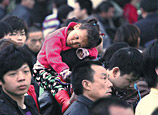
 |
| Anxious Chinese parents exchange contact information of their "leftover" unwed children at a matchmaking corner in People's Square in Shanghai.(Photo by Wang Rongjiang/ Shanghai Daily) |
China's older unmarried women - disparagingly called "leftover" at age 27 - get a lot of attention, but there are far more older single men. If they have money, they're "golden bachelors." Tan Weiyun reports.
Alex Zhu hates to be called a "leftover man" (sheng nan 剩男), a disparaging term for single men aged from 28 to more than 40. Many are eager to marry and start a family, but can't afford wedlock. Some are waiting for the right woman.
The scornful term "leftover" is more often associated with single women age 27 and older - they also come in for names like "moldy tofu" - and it's worse for women because even "leftover" men want younger women to bear a child.
But these unwed men are also called "bare branches," so far unable to perform the highest filial duty of providing a son and heir.
"I'm not left over. Yes, I'm desperate for a happy marriage and kids of my own, and I've got great pressure from parents, but I won't rush into marriage until I find the right one I truly love and respect," says the 29-year-old civil servant in Minhang District. "In addition, I really enjoy my single life now."
China's male preference and family planning policy result in a skewed birth ratio of around 118 males for every 100 females, according to China's sixth and latest census figures. That has grave implications for the shrinking labor pool, social services and care for the elderly, growth of a consumer middle class - and the marriage prospects of tens of millions of men who cannot find a wife.
As a matter of fact, Zhu is one of 12 million unmarried men aged from 29 to 39 in China, according to census.
It also reports there are 5.82 million single women in the same age range.
According to the census, every 136 men for 100 women born after 1980 are unmarried. In the unmarried group born between 1970 to 1980, there are 206 men for every 100 women.



















![]()
